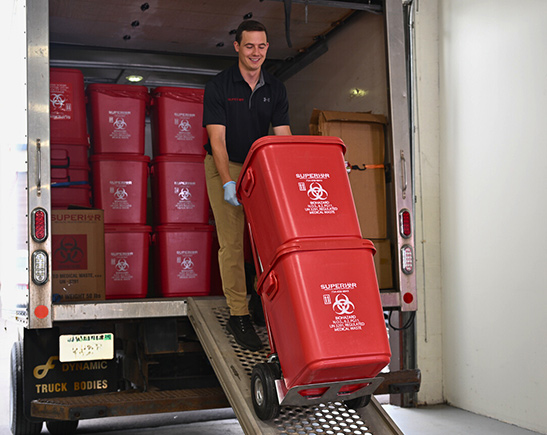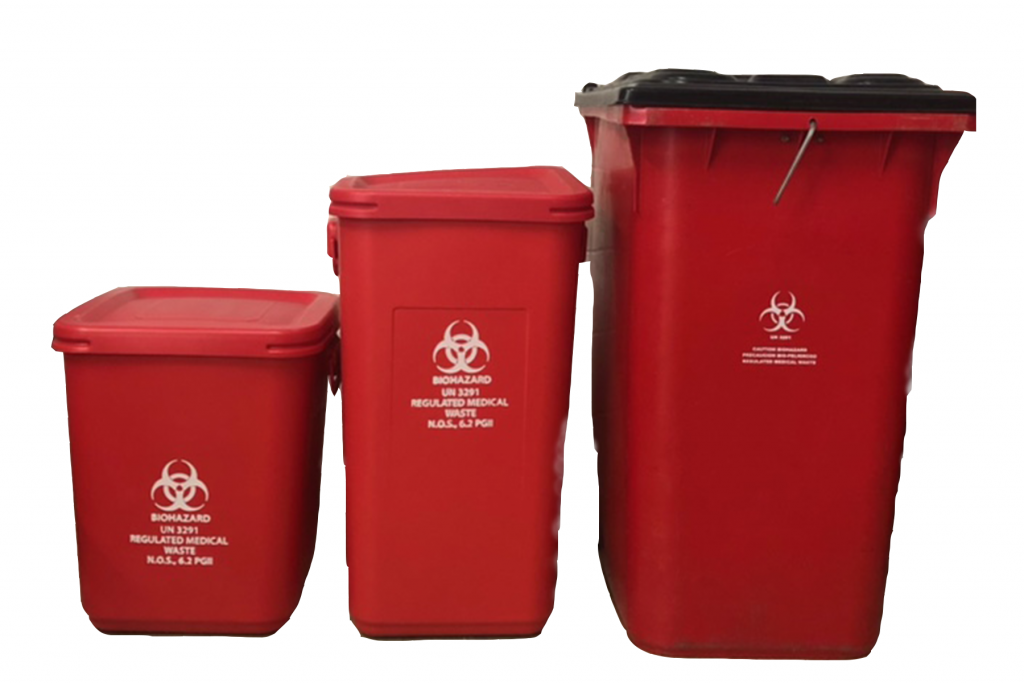Your Relied On Companion: Medical Waste Removal Services Tailored to Your Demands
Wiki Article
Keep Compliant and Safe: Just How to Take Care Of Medical Waste Appropriately
In today's ever-changing healthcare landscape, guaranteeing conformity and security when it comes to clinical waste disposal is of utmost relevance. In this conversation, we will certainly discover the various types of medical waste, the involved threats, the lawful needs, and the ideal techniques for keeping a certified and risk-free medical waste administration system.Significance of Appropriate Medical Waste Disposal
Proper clinical garbage disposal is of utmost relevance in making certain the safety and security and health of both medical care employees and the basic public. Clinical waste, that includes items such as used needles, contaminated dressings, and ran out drugs, positions severe health and wellness risks otherwise taken care of and taken care of properly.
Furthermore, inappropriate disposal of clinical waste can lead to environmental contamination. When clinical waste is not set apart, dealt with, or disposed of properly, it can find its way right into garbage dumps or bodies of water, potentially polluting the dirt, water, or air resources. This can have destructive impacts on environments and human health, as unsafe materials may seep right into the environment or be launched into the atmosphere.
Kinds Of Clinical Waste and Their Dangers
The diverse series of medical waste generated by health care facilities offers different risks that must be meticulously dealt with to ensure correct disposal and avoid possible damage to public wellness and the atmosphere. Clinical waste can be categorized right into different groups based on its attributes and level of danger.One type of medical waste is contagious waste, that includes products that are infected with blood or other possibly infectious materials. This can consist of used needles, syringes, and other sharp items, as well as tissues, swabs, and dressings from people with infectious illness. Inappropriate disposal of infectious waste can cause the transmission of dangerous pathogens and the spread of infections.
One more group is contaminated materials, which consists of products that are toxic, flammable, destructive, or responsive. This can consist of chemicals, drugs, and certain medical gadgets. Messing up or inappropriate disposal of hazardous waste can lead to ecological contamination and posture risks to the wellness of waste employees and the general public.
Radioactive waste is one more sort of clinical waste that need to be meticulously managed. This waste includes products which contain radioactive compounds, such as utilized radiation therapy sources or polluted lab materials. Inappropriate handling or disposal of contaminated waste can result in radiation exposure and severe health and wellness threats.
Last but not least, non-hazardous basic waste, such as paper, product packaging products, and food waste, is likewise produced by healthcare facilities. While this waste may not pose significant threats, it still requires to be effectively taken care of to keep sanitation and prevent the destination of parasites.
To ensure the safe disposal of clinical waste, medical care centers should carry out appropriate segregation, treatment, transport, and storage methods. This consists of utilizing suitable containers, labeling, and training for staff, along with adhering to regional regulations and standards. By attending to the risks connected with different kinds of clinical waste, healthcare centers can secure public health and the setting.
Regulatory and lawful Demands for Disposal
In order to ensure the correct and safe disposal of clinical waste, health care facilities must follow legal and regulative requirements. These demands are in location to protect public health and wellness and the environment from the potential threats related to clinical waste. Medical waste is categorized as an unique classification of waste as a result of its potential to send infectious conditions and contain unsafe compounds.
Some typical needs include the segregation and appropriate product packaging of clinical waste, the usage of accepted containers and labels, and the implementation of risk-free handling and transport treatments - medical waste removal. Healthcare facilities may likewise be needed to keep documents of their waste monitoring techniques and provide documents to regulative authorities upon demand
Failing to conform with these lawful and governing requirements can result in penalties, fines, and reputational damage for healthcare facilities. It is, therefore, vital for health care suppliers to focus on conformity and establish robust waste management protocols to ensure the correct and risk-free disposal of medical waste.
Finest Practices for Safe Medical Waste Management
Healthcare centers have to stick to market best practices to make certain the efficient and safe monitoring of clinical waste - medical waste disposal services with WasteX. Applying these finest techniques not only aids safeguard the setting and public health yet also minimizes the risk of prospective lawful and financial repercussionsAmong the key finest techniques is the appropriate partition and control of different kinds of clinical waste. This involves utilizing color-coded containers and plainly labeling them to guarantee that each kind of waste is go to website gotten rid of appropriately. Additionally, health care centers need to have designated areas for storage space and disposal of clinical waste, with clear standards and procedures in place.
One more vital aspect of safe medical waste management is the training and education of health care team. All employees who handle medical waste must get thorough training on the proper handling, storage, and disposal procedures. It is essential to make sure that personnel participants recognize the possible risks related to clinical waste and are outfitted with the required knowledge and skills to manage it securely.
Normal monitoring and auditing of waste management practices is also vital. This includes on a regular basis assessing waste monitoring treatments, carrying out assessments, and preserving accurate documents. By monitoring waste management techniques, medical care centers can determine any possible concerns or areas for improvement and take rehabilitative activities appropriately.
Lastly, medical care centers ought to prioritize making use of eco friendly disposal methods whenever feasible. This includes making use of waste therapy innovations such as autoclaving or incineration, which can help in reducing the volume and hazardous nature of clinical waste.
Eco-Friendly Solutions for Medical Waste Disposal
Implementing eco-friendly options for medical garbage disposal is important for healthcare centers to minimize ecological impact and make certain sustainable techniques. Standard methods of clinical garbage disposal, such as incineration and landfilling, have been found to release harmful toxins into the air and pollute soil and water sources. Therefore, there is a growing demand for alternate approaches that are both ecologically pleasant and safe.These systems use advanced modern technologies to securely process medical waste within the healthcare facility itself. By treating the waste on-site, transportation discharges and threats linked with off-site disposal are reduced.
Another environment-friendly technique is the fostering of reusing programs for particular sorts of clinical waste. Products such as glass, plastics, and steels can be reused instead of disposed of in land fills. By applying partition and reusing programs, medical care centers can dramatically lower their waste quantity and decrease their ecological impact.
Moreover, medical care centers can check out the use of reusable medical tools and products. By going with recyclable products, instead of single-use alternatives, the amount of waste created is dramatically decreased. Reusable items can be sterilized and made use of numerous times, leading to expense savings and much less ecological impact.
Conclusion
In conclusion, appropriate disposal of clinical waste is important for keeping compliance and making sure safety. Complying with best techniques for safe medical waste monitoring and exploring environmentally friendly remedies can contribute to a liable and sustainable technique to lose disposal in the health care market.
In this discussion, we will certainly discover the various types of clinical waste, the affiliated risks, the lawful requirements, and the best methods for keeping a safe and compliant medical waste monitoring system - medical waste removal services.One kind of clinical waste is transmittable waste, which includes items that are polluted with blood or other potentially contagious products.Contaminated waste is one more kind of clinical waste that have to be meticulously taken care of. Medical waste is classified as a special category of waste due to its potential to transmit infectious diseases and contain damaging compounds
Complying with finest methods for risk-free medical waste management and exploring environmentally friendly services can contribute to a liable and lasting method to squander disposal in the health care industry. medical waste disposal services with WasteX.
Report this wiki page